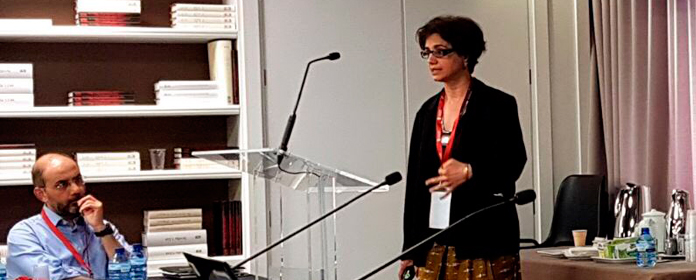"There is no sound basis for claiming that elections serve to impose discipline on politicians."
Amrita Dhillon, King's College London, participated in an NCID and Fundación Ramón Areces workshop on Economics . development

PHOTO: Alberto Cendoya
"There is no solid basis for excessive confidence that elections serve to impose discipline on politicians," said Amrita Dhillon, Professor of Economics at King's College London (UK). She was one of the speakers at a workshop on Economics of development organized by the Navarra Center for International Development (NCID) of the University of Navarra and the Ramón Areces Foundation.
For the expert, in countries at development with weak institutions, citizens trust that, after the elections, "regulations will be put in place to ensure accountability and reduce malpractice". However, she points out that with the election - or re-election - of corrupt candidates this never happens.
In the workshop he presented a work conducted in this line, which concludes that the electoral discipline may be ineffective in reducing corruption when the skill among politicians is too high or too leave. To carry it out, he analyzed data audited diversions from a large public work program in India, in the state of Andhra Pradesh, between 2006 and 2010.
agreement According to the study, corruption has a U-shaped relationship with electoral competition: for intermediate levels of skill, corruption is lower. When there is hardly any competition "politicians with public office can escape with high levels of corruption and still get elected because voters care about other dimensions, such as ethnicity or ideology of candidate".
On the other hand, if competition is too intense, candidates "no longer have an incentive to behave appropriately, as the chances of being fired are no longer related to their effort".
He also explained that the level of corruption usually depends on "whether the fraud comes from the public or private component" and that discipline works best when the public expense in question directly affects voters.
An electronic voting system to prevent fraudThe researcher also referred to the new project that she is carrying out together with department of Computer Science at King's College to design an electronic voting system that avoids fraud and bribery. "Fraud in electronic voting systems is based on the fact that the machines are operated by people who can be bribed," he said. With the same technology behind bitcoin, a completely decentralized electronic voting system will be developed where no mediator is needed.
Amrita Dhillon made these remarks at the framework of the sixth edition of the NCID Research Workshop, an annual international meeting on Economics of development aimed at practitioners, academics and students of postgraduate program. It is organized by the Navarra Center for International Development, which is part of the University of Navarra, at . Institute for Culture and Society of the University of Navarra, in partnership with the Ramón Areces Foundation.
